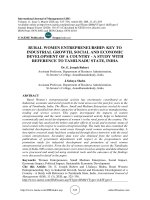Economic growth and economic development 243
Bạn đang xem bản rút gọn của tài liệu. Xem và tải ngay bản đầy đủ của tài liệu tại đây (120.65 KB, 1 trang )
Introduction to Modern Economic Growth
of w). Naturally, the value of the individual at time t can in turn be written as
V (y (t)) =
max
c(t)+b(t)≤y(t)
{u (c (t)) + βV (b (t) + w (t + 1))} ,
which defines the current value of the individual starting with income y (t) and
takes into account what the continuation value will be. We will see in the next
chapter that this is the canonical form of a dynamic programming representation of
an infinite-horizon maximization problem. In particular, under some mild technical
assumptions, this dynamic programming representation is equivalent to maximizing
∞
X
β s u (ct+s )
s=0
at time t. Intuitively, while each individual lives for one period, he cares about the
utility of his offspring, and realizes that in turn his offspring cares about the utility
of his own offspring, etc. This makes each individual internalize the utility of all
future members of the “dynasty”. Consequently, fully altruistic behavior within a
dynasty (so-called “dynastic” preferences) will also lead to an economy in which
decision makers act as if they have an infinite planning horizon.
5.4. The Representative Firm
The previous section discussed how the general equilibrium economy admits a
representative household only under special circumstances. The other assumption
commonly used in growth models, and already introduced in Chapter 2, is the “representative firm” assumption. In particular, recall from Chapter 2 that the entire
production side of the economy was represented by an aggregate production possibilities set, which can be thought of as the production facility set or the “production
function” of a representative firm. One may think that this representation also
requires quite stringent assumptions on the production structure of the economy.
This is not the case, however. While not all economies would admit a representative household, the standard assumptions we adopt in general equilibrium theory
or a dynamic general equilibrium analysis (in particular no production externalities and competitive markets) are sufficient to ensure that the formulation with a
representative firm is without loss of any generality.
This result is stated in the next theorem.
229









